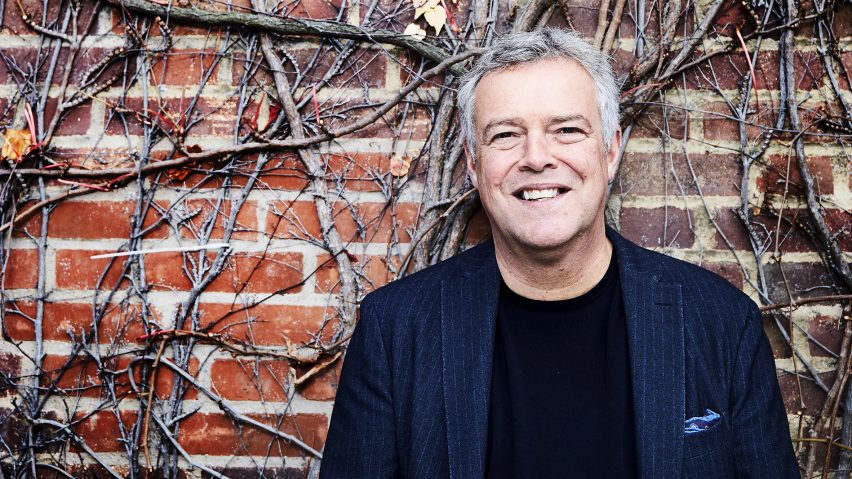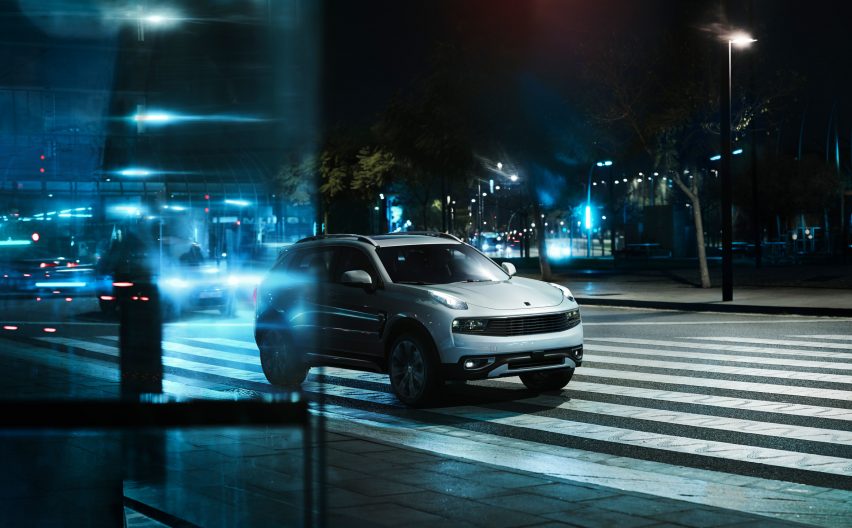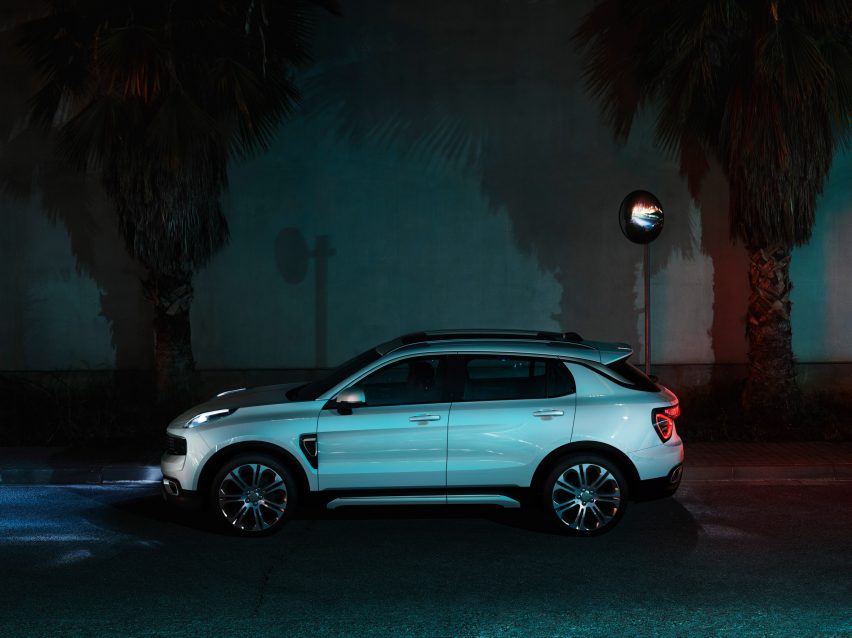
Lynk & Co will "change the industry" with Netflix-style service for cars says Alain Visser
Chinese automotive brand Lynk & Co is set to launch a subscription service in Europe in 2020, which will disrupt the car industry like "Uber has changed the taxi industry", according to company CEO Alain Visser.
Visser says Lynk & Co wants to change an industry that has been "doing the exact same thing for 100 years", by launching its Netflix-style service for cars in Europe.
"Spotify has changed the music industry, Apple has changed the model phone industry, Airbnb has changed the hotel industry, Uber has changed the taxi industry, Netflix changed the broadcast industry," Visser told Dezeen, in an interview at the Auto Shanghai motor show.
"We may be arrogant – or let's say ambitious – enough to say, why can't we be the ones that can change this industry?"
Lynk & Co is world's fastest growing car brand
Lynk & Co was launched by Chinese car manufacturer Geely, using technology developed by sister company Volvo, in 2016.
The company is already selling cars in China under a traditional retail. In 2018 it sold over 120,000 vehicles, making it the world's fastest growing car brand.

However when it launches in Europe, its cars will be primarily available on a monthly subscription, as the "the world doesn't need another car brand," explained Visser.
"We will not promote nor even communicate prices of our vehicles. We want to completely focus on the subscription concept," said Visser.
Users will be able to subscribe for a month at a time, which will include insurance and servicing. Subscribers will also be able to rent out their vehicles on a short-term basis to others.
The first model available in Europe will be Lynk & Co's 01 SUV.
Subscription model targeted at young people
Lynk & Co created the innovative model with the belief that young people are willing to spend money on getting around, but increasingly do not want to own their own cars.
"It was born of the idea that the millennials of this world do not necessarily want to buy a car," said Visser.
"They are ready to spend money on mobility, whether its Uber, taxis or whatever, but they are not ready to commit to spending a large amount of money for a longer period, because they live day-by-day."

Visser believes that, through the subscription, Lynk & Co is offering a service that could just as easily be provided by a company like Google. The company wants to be sure to get in first.
"I think, if the car industry isn't careful, its going to become the supplier to a service industry," he said. "Someone will come up with the services that we are offering, whether its Google or any company, and then car industry becomes the supplier."
"Instead of that happening, we said let's become that service industry ourselves with a car."
Chinese culture "changing from copying to inventing"
Lynk & Co's plan to disrupt the car industry is an example of the growing confidence of Chinese companies, which are set to leapfrog the west when it comes to architecture and design, according to Dezeen editor-in-chief Marcus Fairs.
"There is an openness for new things in China that I have never seen before, there is also a willingness to try out new things," said Visser.
"You see the corporate culture changing rapidly from copying others to inventing and I find it fascinating."
Read the full interview with Visser below.
Tom Ravenscroft: What is Lynk & Co's European plan?
Alan Visser: Our plan has always been China, Europe, US, and that is still the case. We launched at the end of November in China and did our 120,000 sales last year, which made us very proud.
Our plan is to launch in Europe mid next year, starting in Amsterdam. Our distribution model is that we have fixed stores in 10 locations, the first being Amsterdam. They will be relatively small, around 300-square-metre lifestyle shops. Not at all like Tesla, which for us is a city dealership.
For us it will be lifestyle with maximum one car and at nights you have events, and on top of that we have 20 pop-up stores that travel around. These will be in container trucks that drive around between city and will be our advertising as well. That will start at the end of 2020.
We officially start in Amsterdam, but as we are an online brand, if someone in Madrid wants to become a member that is entirely possible.
Tom Ravenscroft: Will Lynk & Co in Europe be entirely on a membership model, or will it be membership and purchases?
Alan Visser: We will not promote nor even communicate prices of our vehicles. However, our strategy is that we are a customer-driven brand, so we do what our customers want. If they want to buy our cars we won't see no, but we will not communicate that.
We want to completely focus on the subscription concept.
Tom Ravenscroft: Can you talk me through the subscription model?
Alan Visser: We launched the concept of a subscription in 2016 and since then nine or 10 car brands have launched something similar as well. According to our analysis, the majority of these are not subscriptions, but a financial lease.
For us the major difference between what is mostly offered by Cadillac, Porsche, even Volvo, is that in our case the subscription is comparable with Spotify or Netflix in that you can sign the contract for one month only. And extend for longer. The commitment of the consumer only extends for one month.
For us that is the whole philosophy of the brand. It was born of the idea that the millennials of this world do not necessarily want to buy a car. They are ready to spend money on mobility, whether its Uber or taxis, or whatever, but they are not ready to commit to spending a large amount of money for a longer period, because they live day-by-day.
So a leasing concept, where you pay €500 a month for six, 12 or 18 months, we believe is not the solution, because these people just don't want to commit and therefore our concept is to do it for one month only.
The other differentiation versus leasing a car is that we will offer the usual stuff – insurance, road car assistance, etc. Also as we try to be a lifestyle brand. We will also offer services in that area, and that can go from membership to clubs and free tickets to concerts. You really become a member of that young social community. That's what we aim to do.
Tom Ravenscroft: How will that disrupt the car market?
Alan Visser: Well they only offer leasing cars.
Tom Ravenscroft: But what do you want Lynk & Co's impact to be?
Alan Visser: The way I see it is that the car industry has been doing the exact same thing for 100 years – we design cars, we engineer cars, we manufacture cars, then we ship them to dealers and they sell and service them.
That is an insanely weird business model, because the only thing every industry would like to do is own the customer touch point, as that is where you build the brand and where you make the money.
What do we do, we source everything apart from that point that we outsource to dealers. So if you see how the consumer has evolved over the past decades and decades, a consumer today has nothing to do with a consumer a decade ago, let alone 100 years ago. But this industry still bulldozers its same model over 100 years.
If you see other industries where these revolutions have happened – Spotify has changed the music industry, Apple has changed the model phone industry, Airbnb has changed the hotel industry, Uber has changed the taxi industry, Netflix changed the broadcast industry, and we may be arrogant – or let's say ambitious – enough to say, why can't we be the ones that change this industry?
That's our ambition, I know its a big one, but we believe that the risk of launching yet another car brand is much greater that starting something new.
Tom Ravenscroft: So you are trying to be the Netflix of cars?
Alan Visser: Yeah. The aim is to be that. And of course when you launch such a thing others follow or do something similar. Netflix is not alone anymore – Apple just launched, Disney just launched, Spotify is not alone anymore – Apple is also there.
I think the need for something new in this industry was a lot bigger. Nobody wanted a smart phone, but it turned out to be something people want. I think people need a new mobility service as the current mobility services are just bad. I just spent an hour and a half driving from my hotel to this restaurant.
The world doesn't need another car brand. That's not the problem, the problem is efficient mobility. So I think what we are saying is let's try to sell an offer of efficient mobility where you don't buy a car, but you buy mobility services. That's our ambitious target.
I would be much more nervous if we wouldn't do all these things, if we just appointed dealers and starter selling our cars.
Tom Ravenscroft: How will the servicing work?
Alan Visser: We have the architecture and the technology from Geely and Volvo, we have the service network from Volvo and all the rest – the distribution, branding and concept – is Lynk & Co.
Tom Ravenscroft: How will not having dealers impact the business model?
Alan Visser: Firstly we don't think you need that many. I always think scarcity is a cool marketing trick. There are so many examples. Abercrombie & Fitch was the most cool brand when they didn't have stores, now that they are everywhere no one wants them anymore. So there is something in that.
But the key reasons are twofold. One is that we want to be there with the customers, but of course cost. Dealer margins are around 15 per cent and on average manufactures spend another 10 per cent on discount to push sales, so today's distribution model costs 25 per cent of revenue.
And everyone hates buying a car. An average European customer buys a new car every six years, so you go through this process once every six years, whereas a good salesman goes through the process everyday, so you know you is going to win that battle.
Tom Ravenscroft: So you aim to change the whole car owning process?
Alan Visser: We want to make it transparent and simple. I know this sounds cheesy, but if you work for the car industry you get the feeling there is something not nice about it. Its not working for the tobacco industry, but there is something not nice about it. We are trying to eliminate that element.
The car industry makes money in after sales, not in new car sales. So we make sure that your car is engineered in such way that you're going to have to come back regularly.
We offer a free winter check-free, so that we can find out that your oil filter needs changed and your wash wipers need a change. That's how the industry works. And we are saying no.
In the subscription method the service is included, so if we have to change the wash wipers or the oil filter our profits go down. We have to make the car good and make sure it stays high quality and on the road.
Tom Ravenscroft: What will you do with the old Lynk & Co cars in the model?
Alan Visser: In our subscription model you can keep the car for one month or a year. When the car comes back, whether that is after six months or three years, it goes back into the subscription cycle.
Then when you go on the configurator on our website you can chose say a black 01 and it says you can have a new one – I'm just inventing a number – for say €500, or there is a 12-month old one that has come back that you can chose and that one costs instead of €500 say €400.
Our secondhand business model is just a cheaper subscription. The older the car the cheaper you get it.
We keep a total transparency and flexibility for the user, which is the main advantage. We almost totally control residual values in the used car market as we keep it within our system.
Tom Ravenscroft: The car industry is very powerful and embedded, and a large number of people like owning a car. What will be the biggest obstacle to get this to work?
Alan Visser: Those people, and there are a lot of them, who want to buy a car, they can buy our cars. I think they are not necessarily our target customer group. But our cars are super, it's the Volvo technology, it's a super great car. There are customers that are not in our target group.
We don't try to please everybody. We come with a concept that we believe attracts those consumers who have a different mindset versus mobility and owning a car and according to our data there's a lot of them.
Tom Ravenscroft: So it doesn't matter that many people still want to own car?
Alan Visser: Those people that go to motor shows are not our customers. We go motor shows here in China because our business model here in China is more the traditional one, in Europe you won't see us at motor shows.
I think if the car industry isn't careful its going to become the supplier to a service industry. Someone will come up with the services that we are offering, whether its Google or any company, and then car industry becomes a supply. Instead of that happening we said let's become that service industry ourselves with a car.
This is what Netflix is doing – they don't just open to the multitude of series and films, they produce their own series and films and put it on their channel. They are the supplier and the distributor.
Tom Ravenscroft: Is this something only a Chinese-backed company could do?
Alan Visser: There is an openness for new things in China that I have never seen before, there is also a willingness to try out new things. You see the corporate culture changing rapidly from copying others to inventing and I find it fascinating.
People ask me "what is the big difference?" The one single massive big difference in China is speed. The speed of things happening in this country is beyond imagination.
I come here every month and land in Shanghai then drive to the office and you pass skyscrapers. You land on the first week of the month then you come the next month and the skyscraper is 10 floors up and you think they have built 10 floors or more in a month.
The same building in Europe and it takes ages. Here it just goes. And in the car industry the same. Everything goes at a speed here we can't even imagine. Its incredible.